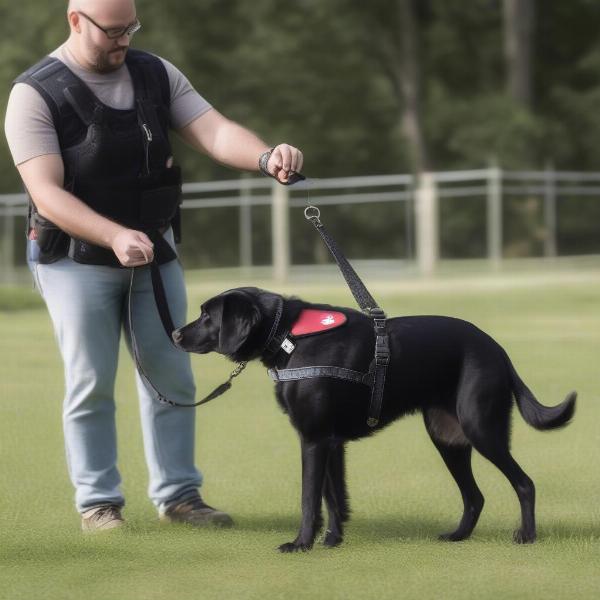Service dog collars are an essential piece of equipment for working dogs, signifying their important role and allowing them to perform their duties safely and effectively. Choosing the right collar is crucial for both the dog’s comfort and the handler’s control. This guide will cover everything you need to know about service dog collars, from different types and materials to proper fit and legal considerations.
Types of Service Dog Collars
Several types of collars are suitable for service dogs, each with its own advantages and disadvantages. The most common types include flat collars, martingale collars, and harnesses.
Flat collars are a basic and affordable option, typically made of nylon or leather. They are easy to put on and take off and can hold identification tags. However, they offer less control than other types and are not ideal for dogs who pull on the leash.
Martingale collars are designed to prevent dogs from slipping out of their collars. They tighten slightly when the dog pulls, but they don’t choke like slip collars. This makes them a good choice for dogs who tend to pull or back out of their collars.  Service Dog with Martingale Collar
Service Dog with Martingale Collar
Harnesses distribute pressure across the dog’s chest and back, providing more comfort and control than collars, especially for dogs who pull or have respiratory issues. However, they can be bulkier and more difficult to put on and take off.
Choosing the Right Material
Service dog collars are typically made of nylon, leather, or biothane. Nylon is durable, affordable, and easy to clean. Leather is more expensive but offers a classic look and can soften over time. Biothane is a synthetic material that is waterproof, odor-resistant, and easy to clean, making it a popular choice for service dogs who work in various environments.
Proper Fit and Identification
A properly fitted collar is essential for a service dog’s comfort and safety. The collar should be snug but not tight, allowing you to fit two fingers between the collar and the dog’s neck. The collar should also display clear identification, including the dog’s name, the handler’s contact information, and service dog designation.
Legal Considerations for Service Dog Collars
While there is no legally mandated color or style for service dog collars, they must be clearly identifiable as such. Patches or embroidery indicating the dog’s service status are commonly used. It’s important to be aware of the laws regarding service animals in your specific location.
What to Look for in a Service Dog Collar
When selecting a service dog collar, consider the dog’s breed, size, temperament, and the type of work they perform. A collar with a sturdy D-ring for leash attachment is essential. You should also consider the collar’s durability, comfort, and ease of cleaning.
Do Service Dogs Need Special Collars?
While not legally required, specialized service dog collars often feature clear identification, such as “Service Dog” patches, and may include handles for better control. These features help the public recognize the dog’s working status and prevent unnecessary interactions.
Can I Use a Regular Collar for My Service Dog?
Technically, yes. However, a dedicated service dog collar enhances visibility and communication, reducing potential confusion or challenges in public spaces. dog walking stoke on trent
What are the Benefits of a Service Dog Vest?
While not strictly a collar, a service dog vest provides clear identification, additional pockets for supplies, and often features handles for improved control and stability. garmin dog collars
Are There Specific Colors for Service Dog Collars?
No, there aren’t specific color requirements for service dog collars. However, highly visible colors like orange, blue, or red, often combined with clear labeling, can aid in public recognition. cape cod hotels that allow dogs
Conclusion
Choosing the right service dog collar is an important decision that impacts both the dog’s well-being and its ability to perform its duties effectively. By considering the various factors discussed in this guide, you can select a collar that is comfortable, durable, and meets the specific needs of your service dog. Remember to prioritize clear identification and adhere to any local regulations regarding service animals. north devon self catering dog friendly
- What is the best type of collar for a service dog? The best type of collar depends on the individual dog’s needs and the handler’s preferences. Martingale collars and harnesses are generally recommended for service dogs.
- What information should be included on a service dog’s identification tags? The dog’s name, the handler’s contact information, and service dog designation should be clearly displayed.
- Are there any legal requirements for service dog collars? While no specific color or style is mandated, clear identification of the dog’s service status is essential.
- How can I ensure my service dog’s collar fits properly? You should be able to fit two fingers between the collar and the dog’s neck.
- What are the advantages of using a biothane collar for a service dog? Biothane is waterproof, odor-resistant, and easy to clean, making it ideal for dogs working in various environments.
- Can I personalize my service dog’s collar? While personalization is possible, ensure it doesn’t interfere with the clear identification of the dog’s working status.
- Where can I buy service dog collars? Service dog collars can be purchased from pet supply stores, online retailers, and specialized service dog equipment providers. dog friendly beaches charleston
ILM Dog is your trusted resource for comprehensive information on dog care, breeds, training, and much more. We provide expert advice and practical tips to help you navigate every aspect of dog ownership. For personalized guidance and support, contact our team of experts. Email: [email protected] Phone: +44 20-3965-8624. ILM Dog is committed to empowering dog owners worldwide with the knowledge and resources they need to provide the best possible care for their furry companions.